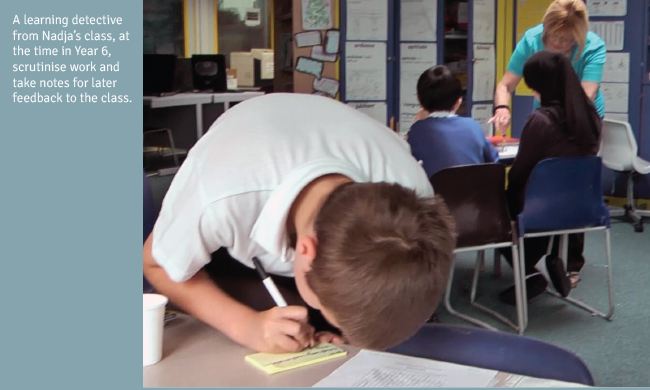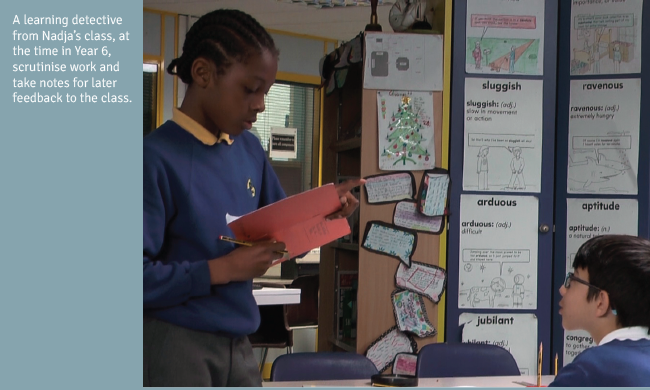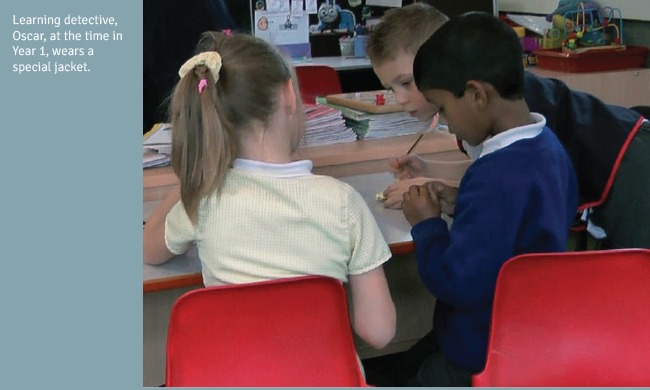In July, Ann Bridgland talked to Staffroom about her Outstanding Teaching Intervention and how the school used the Pupil Premium to help this practical adventure.
“Evidence from our research, and in studies in the UK and internationally, suggests that pupil voice strategies can be transformational experiences for teachers and for pupils. The relationship between pupil voice and teacher development demonstrates how pupil voice strategies have enabled teachers to gain a deeper understanding of the teaching and learning processes and have helped them to change the way they think about pupils and their learning.†1
I am privileged to be working at Earlsmead Primary School in Harrow with a cohort of five committed, reflective-practitioner and enthusiastic teachers, who are undertaking an Osiris Outstanding Teaching Intervention (OTI) Programme.
At the time of writing, we had completed Module 1 of the three modules in the programme. The focus of Module 1 is ‘flow and engagement’. What are the tools and techniques that teachers need to have in their ‘kit’ to create, and sustain, a classroom full of engaged, autonomous and motivated learners?
Earlsmead is a larger than average-sized school. Most pupils are from minority ethnic groups, with sizeable groups from Asian, Black African and Black Caribbean backgrounds. Over half of the pupils speak English as an additional language, with about 26 languages other than English being spoken by pupils’ families.
The proportion of pupils with special educational needs and/or disabilities is above average, as is that of pupils known to be eligible for free school meals. Some pupils come from
traveller families, and some pupils are from an asylum-seeker or refugee background.
The school context is important, not least because the Headteacher and the Governing Body decided to use some of the school’s Pupil Premium funding to support the OTI programme.
Independent research, published by the DfE in July 20132, shows that four-fifths of secondary schools and more than two-thirds of primary schools introduced or enhanced support for disadvantaged pupils as a direct result of the Pupil Premium.
Vox Pops
Reflections and reactions from teachers and pupils on the OTI programme to date are already exemplifying the Cambridge research pearls of wisdom: words which have always resonated with me in my career as a teacher, adviser, trainer and consultant.
So, here are some Earlsmead pupil and teacher voices so far…
An Eye-Opener
Ossai, teaching Year 1 at the time, reflected on the impact of her OTI work so far when watching the Module 1 video of herself and her pupils in action, experimenting with some of the practical classroom approaches that we have been working on.
“It was interesting to see what I have now termed the ‘blind spot’. These are children which I and the TA did not notice were not engaged, therefore were playing around. It was a real eye-opener and made me and the other adults in the class think about the classroom arrangement. It was also useful to show the children what not to do when the teacher is not looking; finally, it was also a good way to praise the children who were completing their activities.â€
Register Challenges
One of the approaches to pupil engagement that is developing across the OTI cohort is a new take on taking the register. Rather than simply calling out a pupil’s name in expectation of the “present†response, teachers and pupils are rising to a different challenge. For example, by saying their name and describing themselves with an adjective that starts with their name’s first letter, or with a word that describes how they feel about their learning today.
Year 1 teacher (and deputy head) Kalpa’s pupils are very engaged by their ‘Register Challenges’:
“They are fun and I like thinking about different things,†said Siddharth.
“They are fun and exciting,†said Gurbuz.
“I enjoy them as they are hard,†said Sushant.
“I like telling everyone about my favourite colour,†said Denosh.
“I like them as they make your brain think!†said Dominic.
“They make everyone think!†said Rasa.
Thunking
Maya, then teaching Year 4, has also introduced ‘thunks’ to engage and challenge her pupils, as well as the technique of challenging them to sum up their learning in, for example, just eight words:
“I have been trying out the ‘thunks’ and ‘what have you learnt in 8 words’. The children have responded really well. They enjoy the thunks as there is no right or wrong answer and they all get involved.
“When they tell me what they have learnt, rather than getting a few responses I get the whole class giving me innovative ways of telling me what they have learnt, as it has simply become a challenge to them!â€
And here is what some of her pupils think:
“I think thunks are fun because there are no wrongs or rights and you can express what you think about them,†said Daniel.
“I think that they are interesting and that they make children think so that their brains start working,†said Olivia.
“I like telling the teacher what I have learnt in 8 words because I use my brain more,†said Puvi.
“I like the word challenge at the end because it is more of a challenge!†said Ajancia.
Sultana also extended her then-Year 2 children’s ‘thunking’. Here is Princess’ feedback:
“I thought the thunk was very helpful, also it was kind of like a brain quizzer and it had no right or wrong answers.
The thunk had weird questions with obvious answers!
Every week there was a thunk question and we as a class discussed it.â€
Sultana was also incorporating such techniques into the ‘Talkabout’ tasks which her Year 2 pupils undertook for homework. “What if you say sorry and don’t mean it?â€
“I think it is wrong to say sorry and you don’t mean it because that means you’re pretending to be their friend and, when you say that, they have to say sorry back and if they say it straight away that means they’re still not your friend.â€

Because, because, because
A key word which is becoming consistently emphasised by the teachers with their new classes this year is ‘because’, important in the development of pupils’ engagement in learning and their ability, independently, to justify and explain their own thinking.
Linking Module 1 with Module 2 (which started in the school in September), the challenge of effective questioning is starting to be explored. ‘What if …’ questioning is one example, which is also encouraging the pupils to take risks with, and justify, their thinking. Here’s an example from Kalpa’s class:
What colour would a zebra be if it lost all its stripes?
“Red because the blood will show up,†said Nivitha.
“White because of the colour of the bones,†said Sushant and Shiloh.
“Grey because it will leave grey from mixing black and white together,†said Rasa.
“White and red because blood is red and bones are white,†said Riyan and Gurbuz.
“Peach because when animals’ fur comes off it is peach colour,†said Ellen.
“Blank because there will be no colour,†said Jermaine.
Classroom thinking challenges are even infecting the school staffroom!

Learning detectives: Some Earlsmead pupils are also becoming ‘learning detectives’, whose task it is to look and listen out for good thinking and learning among their peers. This technique, a favourite of mine both as a teacher and as a trainer, supports learners’ engagement and autonomy by enabling them to take greater control of their own learning:
“I like the learning detectives and they always help us,†said Richardo.
“I like the learning detectives because they help us when we are learning,†said Oscar.
“I like the learning detectives because they make sure children are working,†said Riyan.
“I liked when I was (a learning detective) writing notes and asking children questions,†said Dominic.

Emerging Impact
The strategic leadership of the Headteacher at Earlsmead, Emma, is firmly underpinning this significant CPD programme. It is up to Headteachers to decide what interventions to spend Pupil Premium money on, as they are best placed to understand the educational needs of their pupils, in the context of school improvement priorities.
“The Governing Body at Earlsmead is keen to secure the best progress for as many children as possible. Improving the quality of teaching is key to this, and Governors agreed to the use of some of the school’s Pupil Premium money for the OTI training,†says Emma.
After only a few weeks, it was encouraging for all to see that change was afoot.
“Already, the impact is evident in terms of the quality of lessons observed, and a deeper understanding by pupils of how they are learning, as well as what they are learning. I look forward to the ongoing ‘ripple effect’ into the next academic year and beyond!â€
Since the programme finished in November, it is still rippling!
One last thing…
“You may never know what results come of your actions, but if you do nothing, there will be no results,†says Mahatma Gandhi. SR


